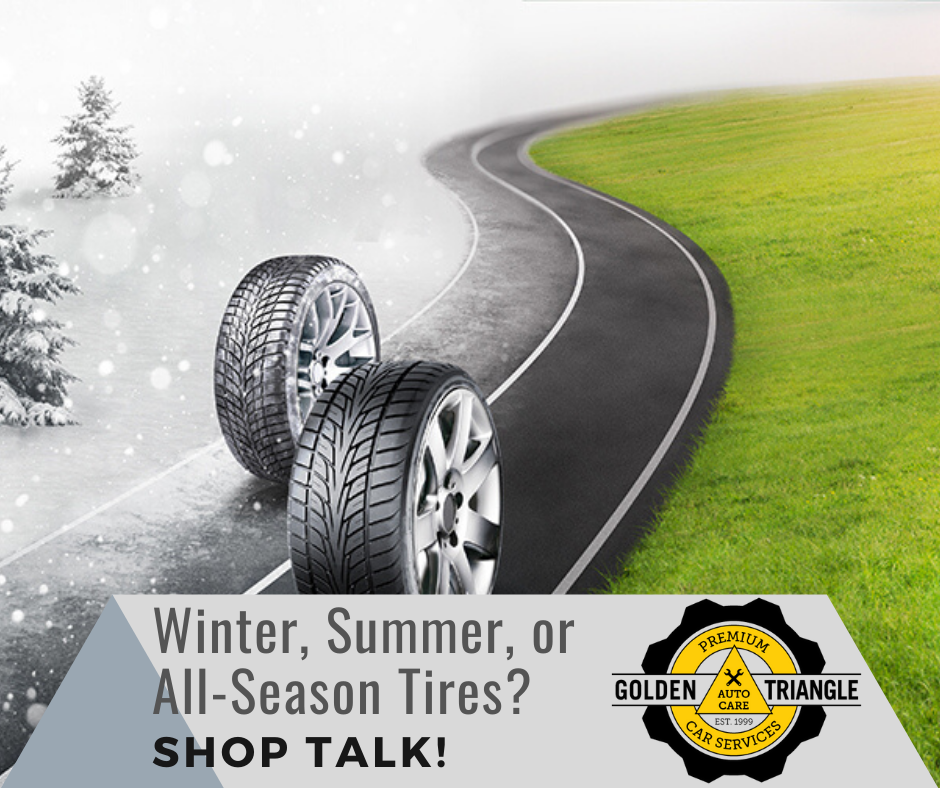
Call Us Now
303-573-1335
 If you have lived in Colorado for any length of time you know the weather goes from one extreme to the other. In January the temperature can dip below zero for several days in a row, and in July the mercury can easily surpass one hundred degrees. With that wide swing in weather over the year, does it make more sense to have summer and winter tires? Or are all-season tires the better choice?
If you have lived in Colorado for any length of time you know the weather goes from one extreme to the other. In January the temperature can dip below zero for several days in a row, and in July the mercury can easily surpass one hundred degrees. With that wide swing in weather over the year, does it make more sense to have summer and winter tires? Or are all-season tires the better choice?
The answer to that question depends on the type of driver you are. Different driving habits will dictate different tires.
For the average driver who relies on their car to get them around Metro Denver driving to and from work, school and local activities, an all-season tire is good. The tire has a rubber composition and tread that provides traction in a wide range of temperatures. One tire will work in the heat of summer and deep freeze of winter. While the gas mileage and overall performance are not as good as the specific seasonal tires, it is typically a good tire for the average driver.
For drivers who need a higher level of performance, from driving through snow and ice to better handling on hot roads in the summer, a specific seasonal tire is needed. The advantage of having summer and winter specific tires is the vehicle is always riding on the better performing tire for the road conditions.
You don’t need a high-end sports car to see the advantages to mounting a higher performance summer tire on your car or truck. Today’s powerful luxury cars and SUVs can benefit from the added response. Summer tires with their softer rubber do a better job gripping the road in the heat and even on wet roads. With a unilateral tread pattern, more of the tire stays in contact with the pavement, providing better traction, handling and gas mileage.
On the flip side, where all-season tires are capable year-round, summer tires are not nearly as capable in the winter. A more segmented, traction pattern is needed when the roads freeze and snow flies. The winter tire with a harder rubber compound is built to find traction when there is none. Mountain driving as an example, where snow is more likely to be present on the roadways, is a good reason to have specific winter tires.
Then there are the things you don’t need on your tires. “Siping” is a process of cutting hundreds of thin slices into a tire’s tread. Siping was invented and patented in 1923 under the name of John F. Sipe. The story told on various websites is that, in the 1920s, Sipe worked in a slaughterhouse and grew tired of slipping on the wet floors. He found that cutting slits in the tread on the bottoms of his shoes provided better traction than the uncut tread. The theory is this provides more traction opportunities for the tire on frozen, snow covered roads. This is true to a point. While there are only a couple of published studies on the benefits of siping, the bottom line is the small advantages gained are not worth the decreased handling and longer stopping distances on dry roads.
Additionally, siping a new tire likely voids the manufacturer’s warranty and adds an additional $60 to $100 to the cost of a new set of tires. In other words, with today’s technologically superior tires, it’s an unneeded up-sell that you won’t find at Golden Triangle Auto Care.
In the end, the choice of an all-season tire or separate summer and winter tires is a decision based on the vehicle, driver and driver’s performance expectations. Golden Triangle Auto Care offers all varieties of tires including remounting of winter/summer tires seasonally – and can assist in determining which path is best for you, your vehicle, and your budget.
